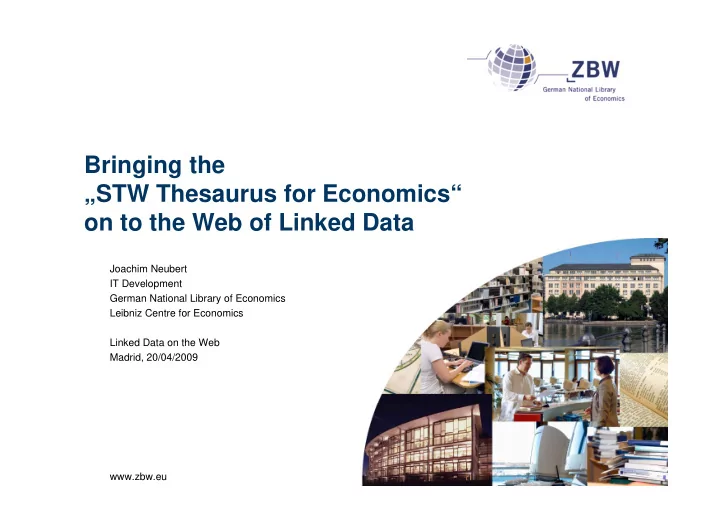

Bringing the „STW Thesaurus for Economics“ on to the Web of Linked Data Joachim Neubert IT Development German National Library of Economics Leibniz Centre for Economics Linked Data on the Web Madrid, 20/04/2009 www.zbw.eu
Contents 1) ZBW and STW Thesaurus for Economics 2) Project goals 3) Conversion to SKOS 4) STW web application 5) STW web services 6) Further directions LDOW2009, Madrid, 20/04/2009 2 / 14
ZBW and STW Thesaurus for Economics • German National Library of Economics (ZBW) / Leibniz Information Centre for Economics is the world’s largest economics library • STW Thesaurus for Economics was developed in the nineties by four economics institutions as “Standard- Thesaurus Wirtschaft”, funded by German government, for the purpose of unifying the use of subject headings in economics • now maintained by ZBW as a controlled vocabulary of about 5,800 terms in German and English LDOW2009, Madrid, 20/04/2009 3 / 14
Project goals • Bring the STW on to the Web • Support users in subject oriented searches • Allow easy third party reuse of the data Assumptions: • To publish the STW in a standard format not easy - no standard or widely agreed upon serialization format for thesauri exists; upcoming ISO 25964 is still a work in progress. SKOS was already in place and looked promising • To publish it under an open license we chose Creative Commons (by-nc-sa) LDOW2009, Madrid, 20/04/2009 4 / 14
Conversion to SKOS • SKOS proved to be extensible enough to cover even the non-standard features of the STW • e.g. subclassing of skos:Concept for descriptors and subject categories allowed a unified skos:narrower/skos:broader hierarchy of concepts and the separation for output and for custom integrity checks • all further work accomplished on a SKOS representation of the thesaurus LDOW2009, Madrid, 20/04/2009 5 / 14
Direct access to library catalog ECONIS
STW web services Experimental services at http://zbw.eu/beta/stw-ws targeted at retrieval support (does not aim to cover the complete SKOS model) / synomyms synomyms takes any string, returns synonym terms, eg. http://zbw.eu/beta/stw http://zbw.eu/beta/stw − ws ws/synonyms?query /synonyms?query=free+trade+zone =free+trade+zone LDOW2009, Madrid, 20/04/2009 9 / 14
STW web services: /suggest / suggest suggest powers STW website LDOW2009, Madrid, 20/04/2009 10 / 14
STW web services: /suggest SPARQL query http://zbw.eu/beta/stw http://zbw.eu/beta/stw − ws ws/suggest?query=asset /suggest?query=asset SELECT DISTINCT ?term SELECT DISTINCT ?term ?concept ?prefLabel ?concept ?prefLabel WHERE { WHERE { { ?concept rdf:type zbwext:Descriptor ?concept rdf:type zbwext:Descriptor . ?concept skos:prefLabel ?term . ?concept skos:prefLabel ?term . ?concept skos:pref ?concept skos:prefLabel ?prefLabel . Label ?prefLabel . FILTER (regex(str(?term), \"^ FILTER (regex(str(?term), \"^$query $query\", \"i\")) . \", \"i\")) . FILTER (langMatches( FILTER (langMatches(lang(?prefLabel), \" lang(?prefLabel), \"$lang $lang\")) . \")) . } UNION { } UNION { ?concept rdf:type ?concept rdf:type zbwext:Descriptor zbwext:Descriptor . ?concept skos:altLabel ?term . ?concept skos:altLabel ?term . ?concept skos:pref ?concept skos:prefLabel ?prefLabel . Label ?prefLabel . FILTER (regex(str(?term), \"^$query FILTER (regex(str(?term), \"^ $query\", \"i\")) . \", \"i\")) . FILTER (langMatches( FILTER (langMatches(lang(?prefLabel), \ lang(?prefLabel), \"$lang "$lang\")) . \")) . } } ORDER BY ?term ORDER BY ?term LIMIT 10 LIMIT 10 LDOW2009, Madrid, 20/04/2009 11 / 14
Further directions • To provide interfaces and widgets to select and aggregate descriptors – for retrieval (eg. to provide canned expressions like „financial crisis“ OR „banking crisis“ OR „stock market crash“ ) • to include narrower terms for searches in fields with controlled values • to add synonyms for full text searches – for indexing (eg. to support authors in tagging their uploaded papers on document servers) • To create or make use of existing mappings to other vocabularies in economics, e.g. the classification of the „Journal of Economic Literature“ (JEL), and put them on to the web • To enrich other library applications with semantic markup LDOW2009, Madrid, 20/04/2009 12 / 14
Conclusions • SKOSifying and publishing an existing vocabulary as RDF(a) opens it up to the web and can make it useful far beyond the scope of a single organisation • for the field of economics and its resouces, the STW provides an interlinking hub and an initial entry point into the web of the linked data • for ZBW and other libraries, it opens up a broad range of more extensive applications, possibly in cooperation with interested people from the linked data community • well defined technologies and practices made it possible LDOW2009, Madrid, 20/04/2009 13 / 14
Thank you! Questions? Joachim Neubert Links: German National Library of http://zbw.eu/stw Economics (ZBW) / Leibniz Centre for Economics http://zbw.eu/beta/stw-ws j.neubert@zbw.eu LDOW2009, Madrid, 20/04/2009 14 / 14
Recommend
More recommend